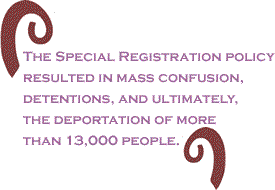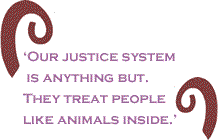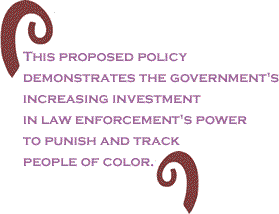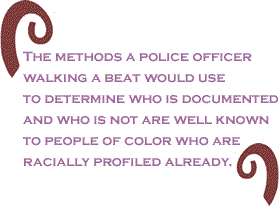The
following article was originally published in RaceWire, a
service of ColorLines
magazine.
"I
was hijacked by the INS, you know." He stared hard at
me.
Mr. "B" and I first met at his attorney's office in August. I was
researching stories of immigrants affected by post-9/11 security policies,
and Mr. "B" had agreed to talk with me on the condition that I
never reveal his name.
The fair-skinned, 40-year-old, Persian man with a slight build and a
button-down shirt sat down before me only after his attorney had rigorously
questioned
me about the purpose of my visit and the outcome of the interview. Mr. "B" was
facing deportation after complying with the requirements of Special Registration.
His court date was a few months away in October.

Starting in November
2002, Mr. "B" had joined the
ranks of more than 83,000 men and boys from North Korea and
24 predominantly Muslim
countries
in Asia, North Africa, and the Middle East who were required to appear
at immigration offices because of the National Security Entry/Exit
Registration
System, or NSEERS. The Special Registration policy resulted in mass confusion,
detentions, and ultimately, the deportation of more than 13,000 people.
Not one terrorist suspect was caught.
On December 1, 2003 the Department of Homeland Security announced
the suspension of the policy, claiming that the program had been
intended
as an initial
step in the development of a full entry-exit tracking program for immigrants
and visitors. DHS's new tracking program, US-VISIT will start December
31 in several airports across the country. When fully implemented,
US-VISIT
will collect information and "biometric identifiers," including
digital photographs and inkless fingerprints, from most visitors entering
the U.S., as well as record their departure. The DHS will still regularly
call in individual registrants for interviews as it chooses.
For immigrants like Mr. "B," the end of Special Registration
does not mean a roll-back of repressive policies, but a streamlining
of their
effects.
When Mr. "B" spoke with me, it seemed like he must have
told his story over a dozen times, because what rushed from him was
a script,
a rapidly
recited list of details, dates, and locations. But his shifting eyes,
fidgeting hands, and twisted mouth belied his emotions as powerfully
as if he were
crying and raging before me.
He had come to the U.S. from Iran in his early teens. Some of his
siblings lived in San Jose, CA, and he had stayed with them through
college. Wanting
to continue the life he had begun here, he attempted to change his visa
from a student visa to an employment visa after graduating. But,
he fell out of
status due to a series of other people's mistakes – the final blow being
when his immigration attorney left for vacation without filing his application,
causing him to miss the deadline. Throughout the confusion and frustration
of that process, Mr. "B" tried to cling to normalcy. A management
level professional in the restaurant industry, Mr. "B" said
working helped pilot him through the uncertainty.

"I
want to be here. I am a professional, a contributing member
of this society," Mr. "B" said, daring me
to contradict him.
Mr. "B," light-skinned and clean-cut, had never
considered that he would be racially profiled. His American
education and economic status
should have made him exempt from those targeted by law enforcement and the
INS, he thought. Other, more desperate people ended up in detention.
"My sister dropped me off at the INS center in San Jose so that I could
Special Register in December of 2002. My family and I decided that it could only
legitimate my efforts to correct my visa status. When I told the INS agent that
I was out of status – I wasn't going to lie – he handcuffed me and told me I
must be detained because I was illegal." He curled his fingers
into quotation marks and spat the word out.
 Mr. "B" spent two weeks in shackles being moved from the South
Bay to Arizona, to Colorado and back to the Bay Area. He was finally detained
hundreds of miles from home in San Diego. He paused, looking out of the window
across the room. Turning to me, he asked, "Do you know what it's like
to be told when to shower, when to eat and sleep, when to stand, walk?" He
was really asking me, looking into my eyes, waiting for my response.
Mr. "B" spent two weeks in shackles being moved from the South
Bay to Arizona, to Colorado and back to the Bay Area. He was finally detained
hundreds of miles from home in San Diego. He paused, looking out of the window
across the room. Turning to me, he asked, "Do you know what it's like
to be told when to shower, when to eat and sleep, when to stand, walk?" He
was really asking me, looking into my eyes, waiting for my response.
"No, I don't." I said.
"Well, I'm glad you don't know what it's like. No one should. I have a lot
of sympathy for prisoners now. Our justice system is anything but. They treat
people like animals inside."
His eyes were on fire as he said slowly, "I feel like the founding morals
of this country have been lost. They don't exist for me, they don't exist
for a lot of people."
"And what are those founding morals?"
"Democracy, fairness, tolerance," he listed with a sarcastic laugh. "Little
things, you know."
I said nothing. I watched him, waiting for what he wanted to say next.
"They are looking for terrorists. Cleaning out the closets, you understand."
I waited.
"Funny thing is, I am the one who feels terrorized today."
Terrorist
and Thug
Months
later, I visited my brother, Sanjeev, in his West Oakland apartment.
We
sat together cross-legged, hands wrapped around warm mugs of
tea. He was agitated, cagey.
"Pigs, man. My friends and I were only talking outside after our meeting.
They rolled up on us like it was the Wild West or something!"
Cursing, he got up for the fifth time to pace around the room, picking up
a book from the table, moving a stack of CDs, almost kicking his tea over.
I wanted to reach over and place my hand on his shoulder, to calm him. Instead,
I let him tell his story, the sentences spilling out like a script, an angry
list of details and emotions.
He and his fellow activists had just walked out of a long meeting. The
group of mostly black men stood outside of a house on a quiet street
in Oakland,
discussing dinner plans in the early evening darkness. From either end of
the street, police squad cars had rushed up to them, sirens wailing. The
officers got out of their cars, hands on their belts, asking what my brother
and his friends were doing. The group faced the officers, hands visible and
jaws set – no one spoke. Then from the tension came a tired sounding voice:
"We're leaving our meeting. We're not doing anything."
I remembered the many times Sanjeev has been profiled, harassed and even
hurt by the police for growing up South Asian in conservative Orange County,
CA. He and his friends were followed every day for a year by two police officers.
They were under constant threat because they were brown and black, because
they could have been a "gang." They were detained on curbsides,
handcuffed at shopping malls. One day my brother came home with sticky black
ink on his 15-year-old fingers – they had taken them into the station, just
to scare them, because they could.
Alternately mistaken for African American or Al-Qaeda with his goatee and
long dreads, my 23-year-old, Sri Lankan brother has found himself face to
face with police officers throughout his life.

I could see from his eyes he was more than angry about
this - he was scared, too. For my brother, as
well as for thousands of other dark-eyed
faces in
post-9/11 America, it's the bigger picture that is frightening. It's the
terror of losing your job, your freedom or your family – your American life
that scares us. Just like Mr. "B," my brother has to watch his
back.
Special
Registration's chilling effects are guaranteed longevity
through proposed legislation such as the Clear Law Enforcement
for Alien Removal or CLEAR Act. Like NSEERS, this proposed
policy demonstrates the government's increasing investment
in law enforcement's power to punish and track people of
color. The act demands that local and state law enforcement
act as immigration agents, or face losing millions of dollars
in funding. The methods a police officer walking a beat would
use to determine who is documented and who is not are well
known to my brother and to the thousands of people of color
who are racially profiled already. The CLEAR Act would make
such civil rights violations the rule of the streets.
Mr. "B"'s deportation case was scheduled before
his Special Registration anniversary date and before the
policy was suspended. The reprieve is of
no help to him or the many others who have gone through the process already.
In New York, family members of those still sitting in detention centers
and those who have already been deported are planning to demand an apology
and
a reversal of all pending deportation orders from DHS.
"I have not seen my dad in nine months," explained Special Registrant
Mohammed Ali's daughter Navila.
"Before they detained my dad, I was the child of the family. Now I am paying
bills and trying to keep up with college. Special Registration does not
serve national security. It destroys families," said Navila.
New York immigrants, like those around the nation, could not predict that
their voluntary participation in Special Registration would result in the
humiliation and ruin they are dealing with now.
For
Mr. "B," it may be too late. I sent him an email
in November, wanting to know how he was doing and the outcome
of his deportation hearing in October. I have not yet heard
back from him. I am starting to wonder where he is.
I hope that his family does not have to wonder, too.
Fear
Remains
In the early
fall, I headed to Chicago to find more stories of discrimination.
The thread winding from California to Illinois, through different
communities and ethnicities, was fear.
"The fear stays with you," Mr. B had told me when we met in the summer.
"This process is not over so it's on my mind always," he added. "I
know some people who registered who cannot work anymore. People stopped eating,
their anxiety was so great. It's hard to go on when you know that you face the
same thing in a few months."
Emboldened police, new repressive legislation, and the damage done to lives
and livelihoods through policies like Special Registration all combine to
trap fear in the hearts and neighborhoods of people of color.

"[The area] used to be so full of life; everything has turned around; people
got scared, especially about the government deadlines [for Special Registration]," related
a shopkeeper in Chicago's predominantly South Asian neighborhood off Devon
Avenue.
Other cities have seen restaurants and businesses close their doors, sometimes
emblazoned with American flags, because people are afraid to go out. Those
who stay in have been visited by the FBI and former INS at six in the morning
or 11 o'clock at night. In New York, more than 20,000 Pakistanis fled to
Canada hoping to find asylum.
Across the country, people stare in wonder at the gaping breach these
policies and practices have created in their lives. Vibrant communities
have been
turned into grids of blank avenues.
The fall-out of the past year is still very real for those left behind
and for those missing or gone. Special Registration may have ended
but don't
get comfortable, because racial targeting has not.


























 Mr. "B" spent two weeks in shackles being moved from the South
Bay to Arizona, to Colorado and back to the Bay Area. He was finally detained
hundreds of miles from home in San Diego. He paused, looking out of the window
across the room. Turning to me, he asked, "Do you know what it's like
to be told when to shower, when to eat and sleep, when to stand, walk?" He
was really asking me, looking into my eyes, waiting for my response.
Mr. "B" spent two weeks in shackles being moved from the South
Bay to Arizona, to Colorado and back to the Bay Area. He was finally detained
hundreds of miles from home in San Diego. He paused, looking out of the window
across the room. Turning to me, he asked, "Do you know what it's like
to be told when to shower, when to eat and sleep, when to stand, walk?" He
was really asking me, looking into my eyes, waiting for my response.



